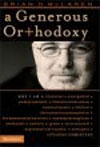A Generous Orthodoxy
a while back, i made myself a little list of things to blog about when i had more time. looking at that list just now, i realized that there are a few books i read this summer that i never commented on. i think that this summer, i had three favorite theology-type books: A Generous Orthodoxy, The Irresistible Revolution, and Velvet Elvis. well, i guess aside from those, most of what i read were psych books. but it was nice to read several christian books that i thoroughly enjoyed.
i've commented (however briefly) already on Velvet Elvis, and would need a copy of Irresistible Revolution around to comment on that. so for today, i'll focus on A Generous Orthodoxy by Brian McLaren.
to begin, i'll give the complete title: A Generous Orthodoxy: 
why I am a missional , evangelical, post/Protestant, liberal/conservative, mystical/poetic, biblical, charismatic/contemplative, Fundamentalist/Calvinist, Anabaptist/Anglican, Methodist, Catholic, Green, incarnational, depressed-yet-hopeful, emergent, unfinished Christian.
and we have a winner for longest book title.
so i know that McLaren is a controversial figure. everyone wants to hold some sort of opinion of him: he's a saint, a sinner, a heretic, a new kind of christian, a universalist, an unbeliever, he's too this or that. whatever. people who know him speak of his gentleness. to me, that speaks volumes beautifully. so far, this is the only book i've read by him. it's amazing that it seems i've read more pages about him than actually written by him, especially considering how much he's written.
for those who may not even want to hear a word he has to say, i offer this quote from his book regarding his take on scripture:
then he offers the analogy that of all the things that he is as a person, he is "both a creation of God and pro-creation of parents who, in partnership with friends and teachers and authors and culture in general, helped make" him all he is today."All Scripture is God-breathed and is useful for teaching, rebuking, correcting and training in righteousness, so that the man of God may be thoroughly equipped for every good work" (2 Timothy 3:16-17).
What is meant by God-breathed or inspired? God's breath is associated, from the first verses of the Bible, with creativity and life-giving vitality. In Genesis 1, again and again, God breathes out (metaphorically, of course: we're not saying God has lungs, vocal cords, air to vibrate them. . . ): "Let there be. . . " And God's creative brush gives permission to whatever possibility (light, trees, fish, people) to become actual. . . actually come into being. In this primal, sacred narrative, the creative breath of God is associated with God's life-giving Spirit (the linguistic connections between Spirit and breath or wind are profound), who first moves over the chaos of the waters so they yield their creative possibilities and eventually teem with life, and who then enters humanity, making each person "a living soul," or a living person.
To say Scripture is God-breathed is, then, to elicit this primal language of creation. Think of the difference between a corpse and a living, breathing body, and you'll understand the difference between a bunch of words and words vitalized with God's breath. But even understanding this, how do we understand the interaction between God's breath or impulse and the human impulses that produced the Scriptures, including this letter of Paul? After all, it was very obviously written by one human being to another, in a certain time and place, dealing with certain situations and needs, bearing all the marks of Paul's humanity, including his personal opinions. . . and biases. . .
McLaren holds a high view of scripture without ignoring the reality of human authorship. this is a delicate tension and balance, and i appreciate his honesty in the midst of it. too many of us will tend to fall to one side or the other, with a refusal to hold both at once.
this tendency to stand in the middle, to hold the tension of opposing sides is the general gist of this book (as is obvious in the lengthy subtitle).
my favorite chapter was his chapter on why he is a liberal/conservative. the beauty of it was that it is a piece that can stand on its own and speak to anyone beyond political leanings. he expresses his grief over the fact that each side tends to see their good points and contrast them to the opposing side's bad points. he challenges readers to instead focus on the opposition's good points, and see those as a cause to grow and change, and see the negative things of one's own side as things that can be worked on and changed. it really sounds to me as something that goes well beyond liberalism and conservatism and into our daily lives, how we interact with others, and how we approach others with differing beliefs. i think he expresses much wisdom.
i also appreciate his willingness to learn from traditions other than his own, to honestly engage those things in each that aren't as good, and embracing the positive at the same time.
anyway, i think it's a beautiful book. i wish that we could all have a more generous orthodoxy.




No comments:
Post a Comment